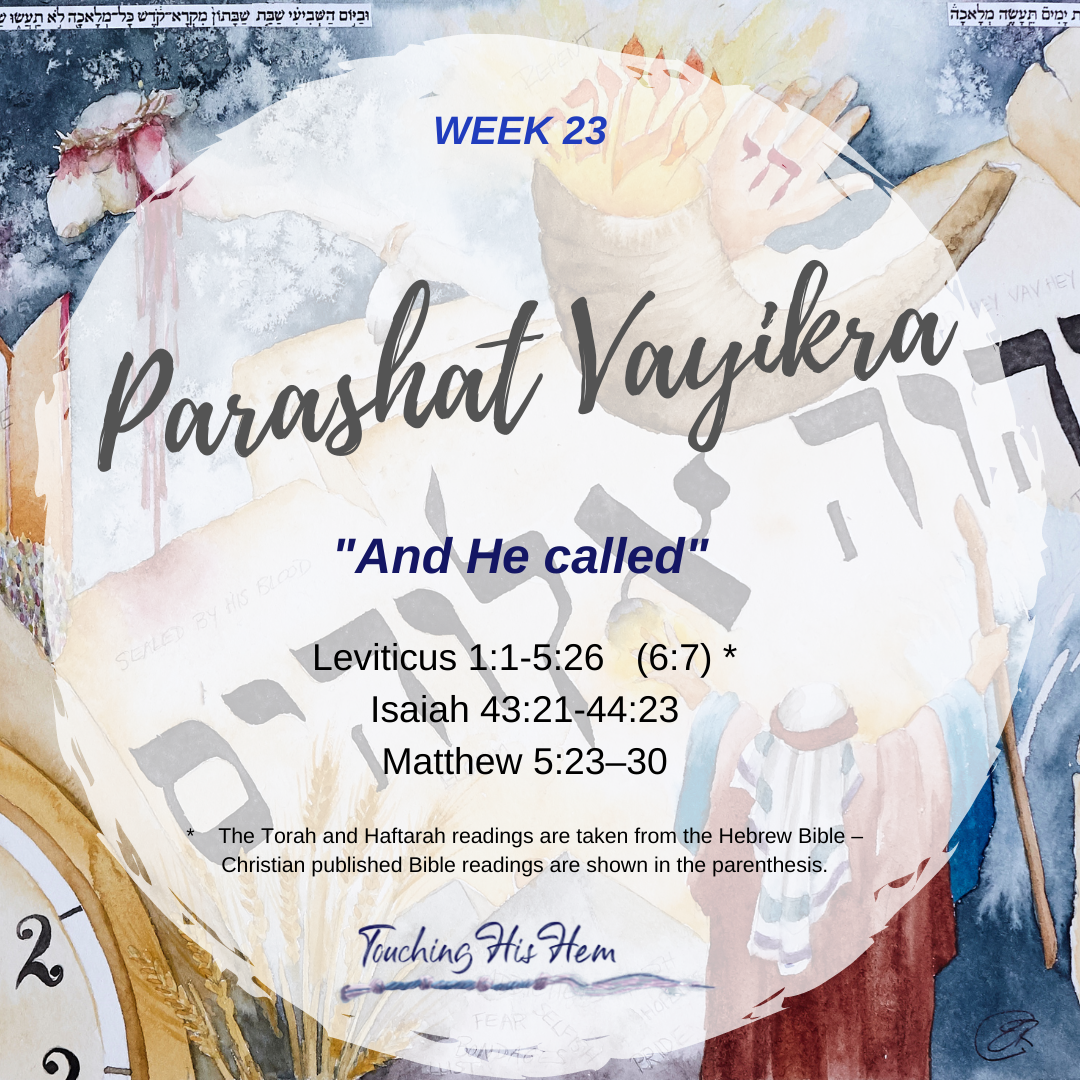
Vayikra - And He called
Share
Vayikra – He called
Leviticus -- meaning the laws of the Levites is the third book of the Torah. The Hebrew name of this book is Vayikra. If we look really deeply, this third book of Torah is so much more than the “laws of the Levites” instead, its core focus is on the depth of HaShem’s calling on our lives.
This book takes place over 30 days and in the 1st Month of the second year of the Israelite's time in the wilderness.
This book of Vayikra starts with a focus on offerings or korbanot. I know for myself, growing up in the Christian church, I always saw the offerings as atonement for sin and an old-fashioned way of appeasing an ancient God, this was such a sad way to see the sacrifical process. The truth is, that only one of these five offerings is for sin – and this is for unintentional sin. If this offering was for intentional sin it would be sanctioning sin. Our Heavenly Father knew that we would fall, from the moment Adam and Chava ate of the Tree of Knowledge of Good and Evil this was man’s fate. This moment in the Garden would seal man into a battle with his flesh (nefesh) for the rest of life on earth until the return of Yeshua, our Kinsman Redeemer.
The offerings – korbanot described here in Vayikra are so vastly different from pagan sacrifices that the Israelites would have witnessed in Egypt. These korbanot were about drawing near to YHVH – a prophetic picture of us pressing through the barrier of sin through the blood of Yeshua into the presence of our Father!
This was about a relationship with a merciful YeHoVaH! Not once in the book of Vayikra is the name Elohim used – only the name of YHVH. If we look at the book of Vayikra with our veiled eyes we would see a book of strict rules, inflexible instructions and a barrage of do’s and don’ts that were put in place to limit our lives and to be a burden to us. If, however you choose to look at this book unveiled, we will see a stunningly different story – we will see one of deep love, nurturing guidance and astounding mercy! The name YHVH is all about mercy and the name Elohim is all about justice. The message our Great I AM is sending to us is that He has created these guidelines for our well being, for abundance in our day to day lives and a deep shalom that can only come from walking under His covering.
What caught my eye in particular this week was the grain offering or the Minchah korban – perhaps it is because we are preparing for Passover next week that this one has leapt out at me. Here in chapter 2 verse 13 the word salt is used 3 times. When something is repeated in Scripture like this it is emphasising something of value and leaning.
What is the meaning of salt in the Word?
Salt is the word melach in Hebrew. It sounds a lot like the word melech which means King – this is very significant too. Salt is directly connected to our relationship with our King.
Salt is all about covenant. 2 Chronicles 13:5. Salt is a preservative; it makes things last longer and therefor it is a sign of a perpetual covenant. This grain offering is all about laying down that which is to do with the work of our hands – surrendering this to Abba Father and acknowledging His covering over our work and provision.
Salt is a symbol of friendship and relationship. Even when salt is dissolved in water it remains salty and when this water evaporates the salt crystals are left behind. Salt has immutable properties and is a symbol of Father’s everlasting love for us. Psalm 136
This everlasting love, used within this grain offering tells us that each time we put our abilities and strength to earn a living, to provide for our families before YHVH it is Father’s everlasting love and provision that will sustain us! It is His hand over us that enables us to produce wealth and to provide for our families. Deut 8:18
Salt also adds flavour and nourishment. Do we add flavour and nourishment to our family, community and circles of influence? Matthew 5:13 Are you being the salt of the earth? The salt of the earth is referencing a fertiliser salt that adds nourishment to earth enabling crops to grow. The abundance of the soil is directly linked to the abundance of our harvest – both spiritual and physical.
Salt sustains life and signifies faithfulness, it had great value in the days of old. When Father was instructing the Israelites to add salt to the korbanot is was with great significance - we are called to be the salt of the world as Believers. Matthew 5:13
We are called to be the light and the salt, we are called to be an example of the covenant – to shine the glory of our King. We do this by earnestly seeking after Him and choosing to walk in His ways, keeping His Torah – to asah - to do, to build the Kingdom, to place Him, Yeshua, as our cornerstone and to be an influence of righteousness amongst a generation of the lawless ones.
We can only be the salt by walking in his truth and we can only do this in His strength. Our first step is choosing YHVH above all else and desiring to His will above our own and this means keeping His commandments.
Happy Torah study!
Shalom blessings to the ‘Salt of the Earth’! Michelle
Last years thoughts on the 5 Korbonot will be up on the blog too for those who would like to ready about these.
www.touchinghishem.eu
